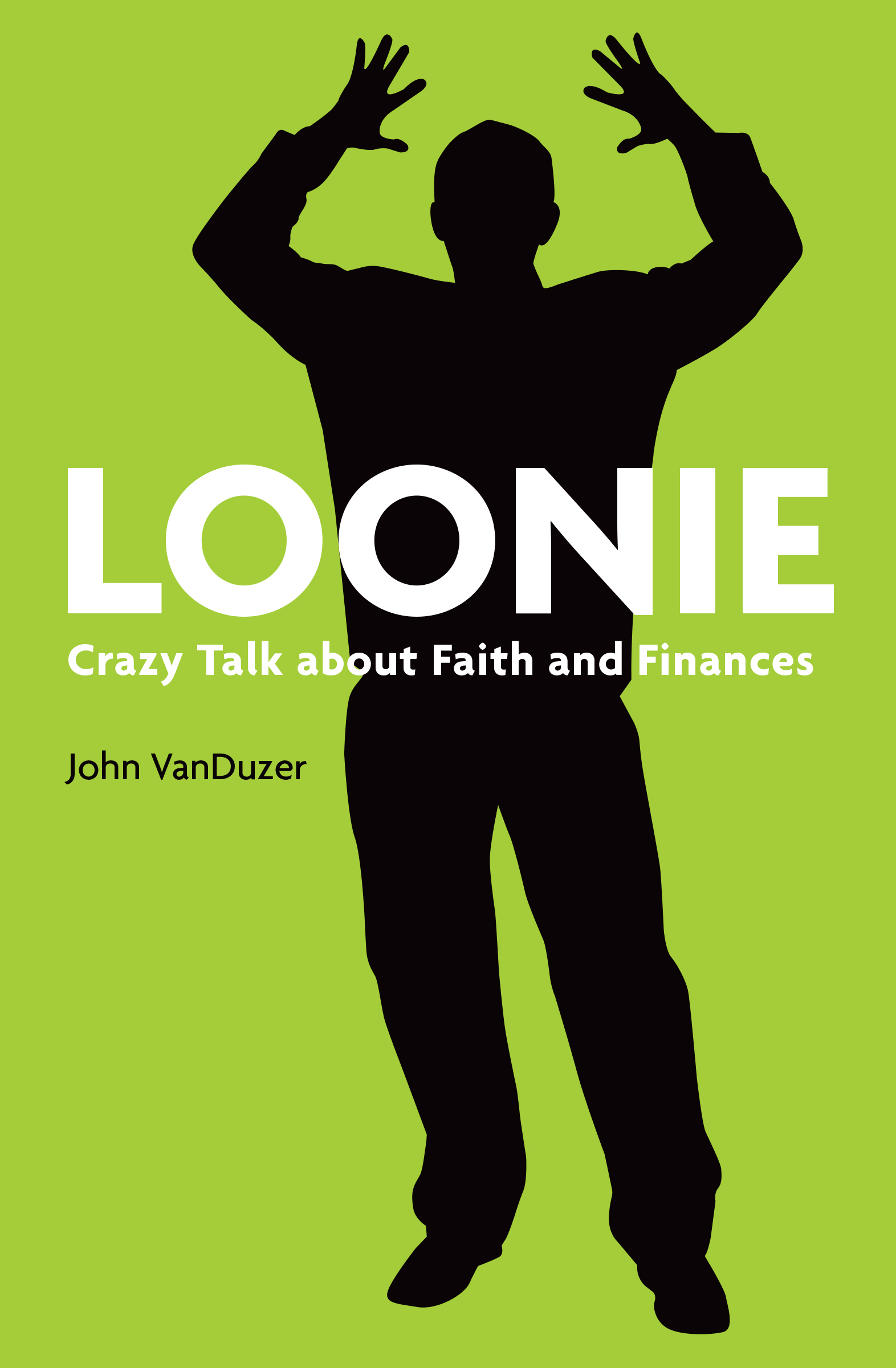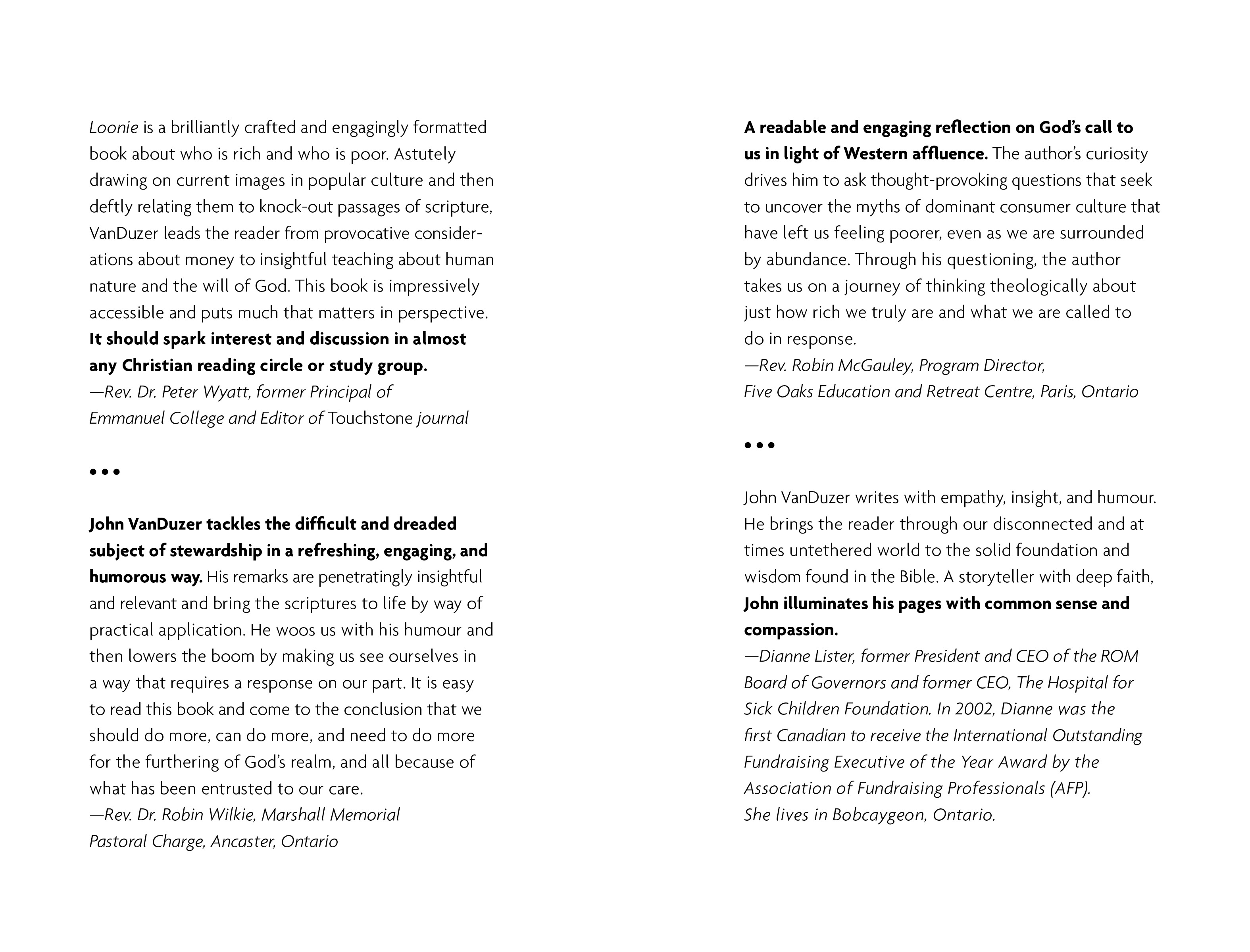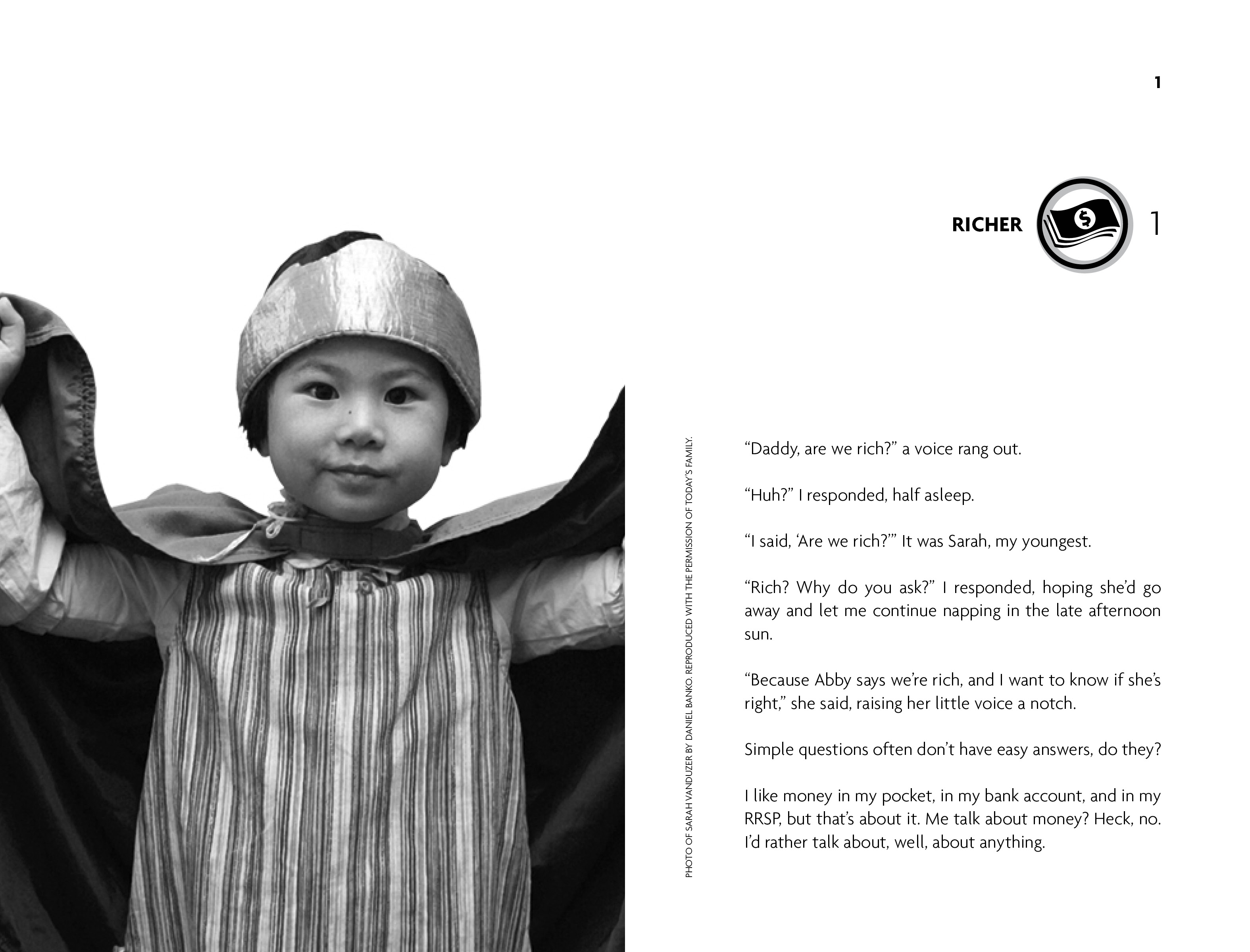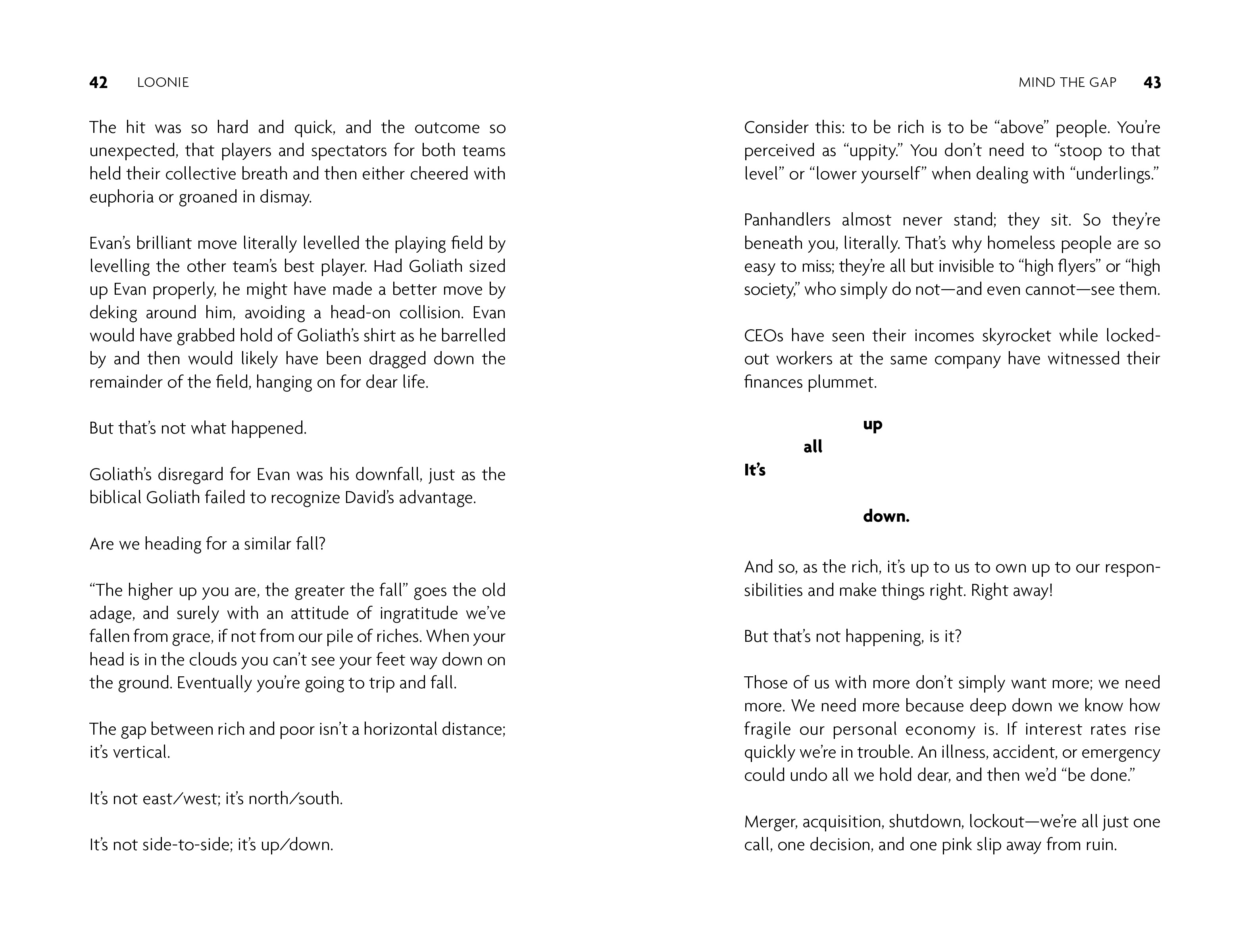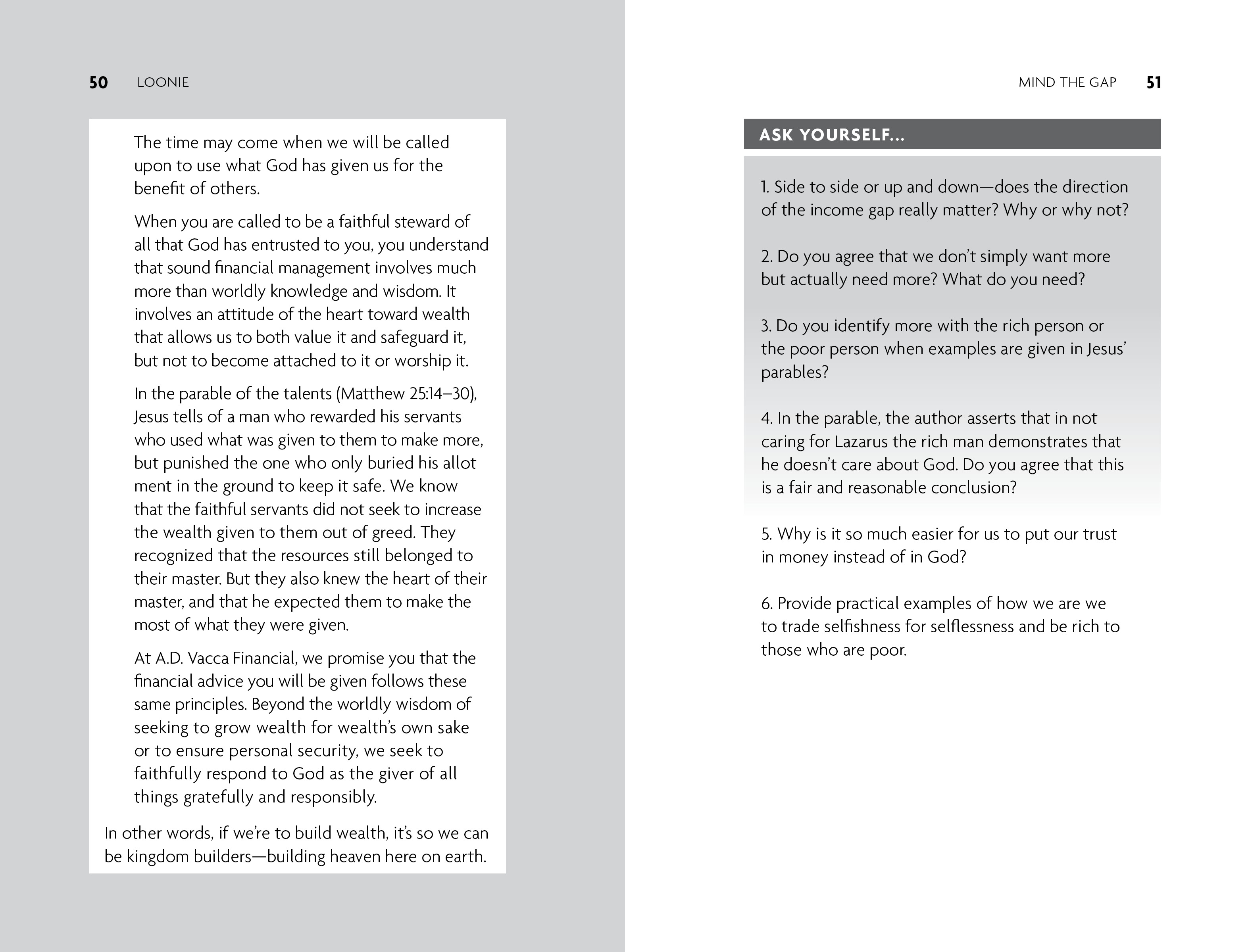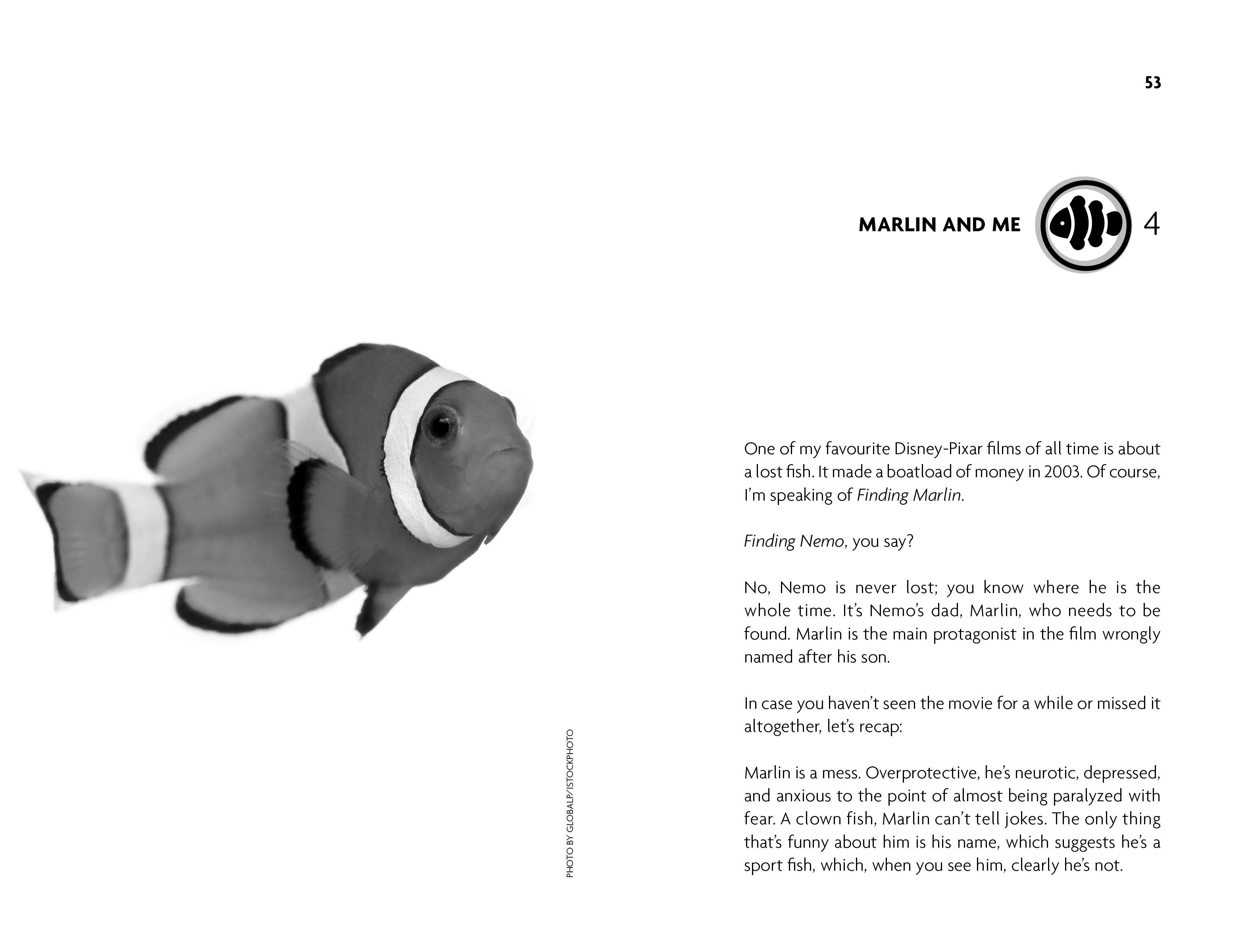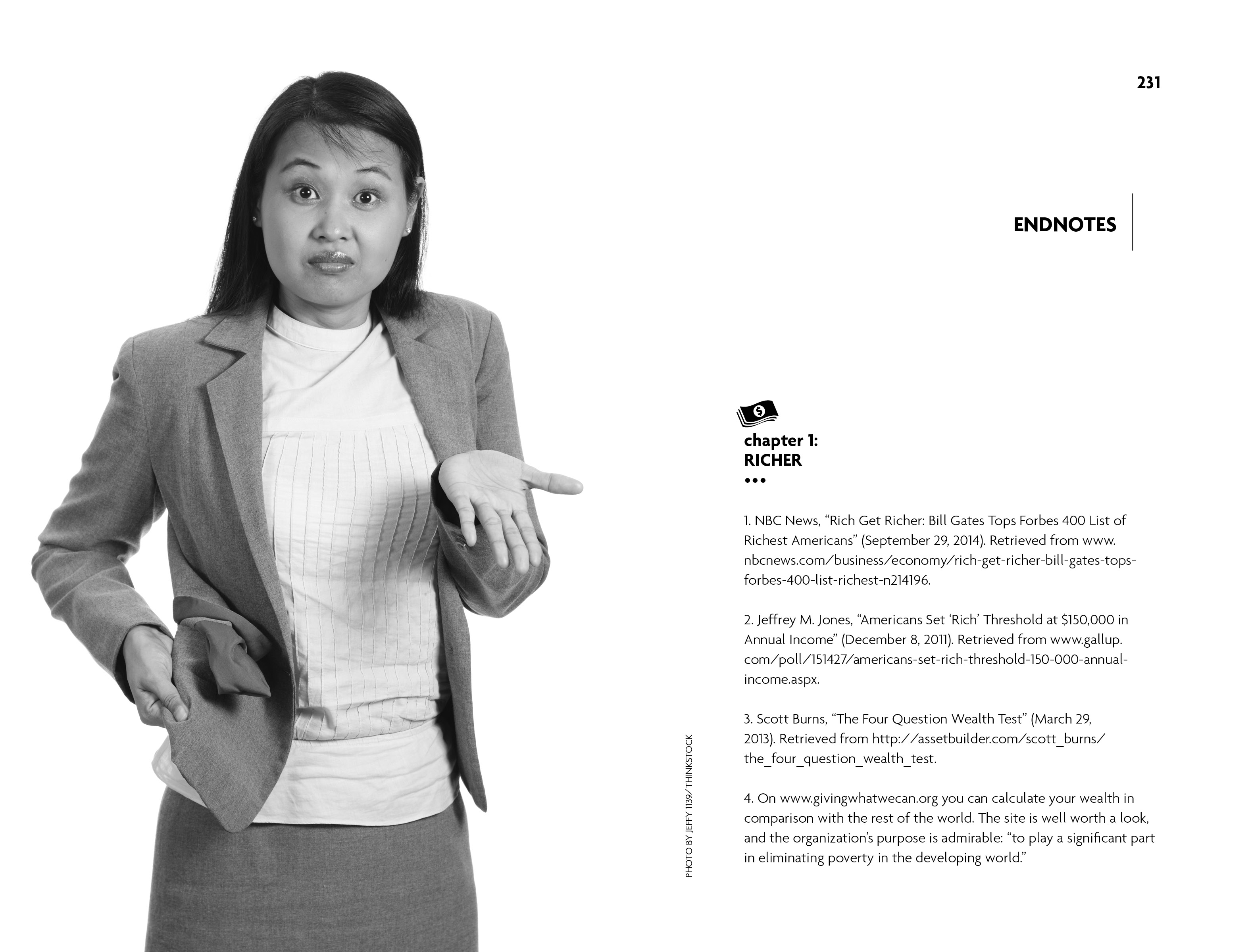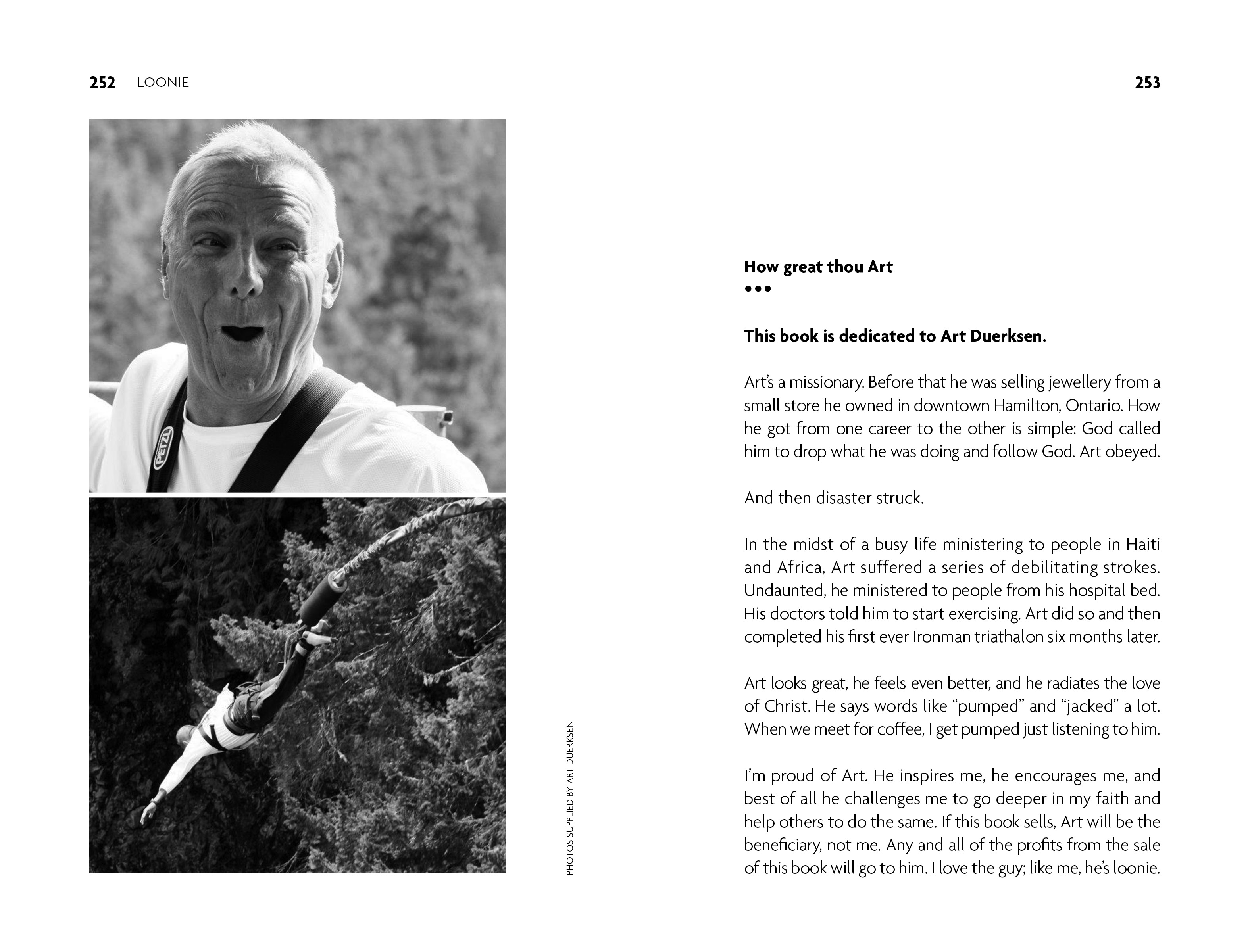I like money in my pocket, in my bank account, and in my RRSP, but that’s about it. Me talk about money? Heck, no. I’d rather talk about, well, about anything.
Anything EXCEPT money.
“So?” Sarah interrupted my dreaming.
“So, what?”
“So, are we rich or what?!”
“I dunno,” I said somewhat stupidly. “What d’ya think?”
“I THINK YOU SHOULD KNOW THESE THINGS!!! That’s your job — to know these things! Me? I’m just a kid; I get to play, go to school, sleep with stuffed animals — that’s what I get to do. You’re the dad — you’re supposed to know about money!”
• • •
Rich. What’s rich?
I have an aunt; she’s rich. She’s loaded, in fact. My brother’s rich, too, I think. Deservedly so; he works hard and runs a smart business. But what’s rich, exactly?
How would you answer?
My phone’s smart, so I asked Siri.
She said that despite being unemployed, despite spending all his time giving all his money away, Bill Gates is not only rich but also the richest of the rich and worth about $81 billion.
But I thought he’d donated it. Maybe they didn’t cash his cheque. Maybe the cheque is in the mail.
That said, I didn’t want to know who’s the richest — I wanted to know if I’m rich. Siri searched the Web for me, and this is what she found:
According to the US Census Bureau in 2011, the median annual household income in the States is roughly $50,000 per year. Gallup — the pollsters — asked people making $30,000$50,000 what they’d have to make in order to be rich, and they said they’d have to earn $100,000.
So, $100,000. That’s rich. Case closed.
But just to be sure, Gallup asked those with a household income of $100,000 if they were rich, and do you know what they said? Heck, no, we’re not rich; you’d have to make $200,000.
So, $200,000. THAT’S RICH. Case closed.
Gallup then asked those making a household income of $200,000 to confirm what they already knew, and don’t you know, they got a different answer: $500,000. And those making $500,000, surely they’re rich. But no, it’s not an annual income that makes you rich according to them, noooooooo. It’s net worth; $5 million oughta do it. After everything’s paid off, of course.
That $5 million, that’s free and clear. No liens on their Lexuses or Deloreans.
So this issue of being rich, it’s relative. Not as in “my dad’s worth more than your dad” kind of relative, but relative as in “it depends.”
Depending on the situation I might have left well enough alone, tucked my darling into bed, and gone to bed myself, but now I was curious.
What’s rich? Or more exactly, who’s rich? And specifically, am I rich?
Siri connected me with Scott Burns, “a principal of the investment firm AssetBuilder Inc.,” who wrote, “Who knows, you might be wealthy and not know it!”
He added wryly, “You could also be poor and not know it, which is more likely.” But I was hooked. I needed to know.
Burns went on to state the basic problem: we don’t have a shared definition of wealth. Well, gee, I knew THAT; Gallup just proved it!
Burns continued, pointing out that glossy magazines are filled with pictures of conspicuous consumption, articles about the very wealthy, and ads portraying mostly wishful images of what marketers want us to think: being wealthy is about having stuff—and lots of it.
Stuff.
Stuff makes you rich. I get it: “He who dies with the most toys wins.”
Burns went on and on, but I wasn’t interested; I was looking for empirical data. I needed to widen my search on the World Wide Web to include the whole wide world. We’ve all heard stories about people living on a buck or two a day — I’ve met some — but I wanted a look at everyone.
• • •
Remember those protests, the Occupy Movement, those denouncing the 1 percent for their ill-gotten gains? They had a point, surely—the rich are incredibly rich, and the poor are incredibly poor. Things are getting worse; something must be done.
And then I swore at Siri. “No way,” I said. “This can’t be true.”
Because this is what she had to say: if yours is a household with an income of $34,000 or more you are—are you ready for this, are you sitting down? — in the top 4 percent of all the households in the world. The top 4 percent!
But 1 percent, surely that’s a huge income. Right? No, not really; it’s only $45,000 a year.
That’s right. And it bears repeating:
A household income of $34,000 puts you among the top 4 percent in the world.
To get into the 1 percent — to breathe in the exact same rarefied air as Bill Gates, Warren Buffet, and Don Cherry’s tailor — you need to make only $45,000 a year.
I’m not one to play dumb. Yeah, I know the Occupy Movement was targeting the richest of the rich; the top 1 percent of income earners compared to the other so-called 99 percent. Sure, I think CEO salaries are outrageous (“Top Canadian CEOs earn annual worker’s salary by lunchtime on Jan. 2” was the headline on the CBC News webpage on the second day of 2014), but c’mon — for most people in the world we’re just splitting hairs. To them, rich is rich; they don’t see a difference.
Turns out the average family isn’t so average after all. The average family in our country has more than three times the income of those living in poverty in our OWN COUNTRY and nearly 30 times — that’s three zero times — the global average.
And not only are we rich, but we’re also getting richer.
The Globe and Mail recently reported that Canadians’ net worth is up, up, up. In fact, our net worth, liquid assets, and real estate are all at record highs.
How rich is rich?
Well, at the end of 2012, Canadians broke the $400,000 net worth threshold, up 5.8 percent over the year before.
And by the end of 2013 we were up to $442,130 according to Environics, whose job it is to figure this stuff out for us.
Helped in large part by rising real estate prices, Alberta ($531,067) and British Columbia ($591,047) are the richest of the rich in Canada. And although you’d never know it by listening to the news, Ontario has it pretty good with an average net worth of $523,969.
The analysis done by Environics Analytics reveals that at the end of 2013 the average household in Canada had total assets of $564,834 and average debt of $122,705, for an average net worth of $442,130. Because of a hot housing sector, average wealth increased 7.7 percent from the end of 2012 and was up 28 percent from the end of 2007 before the recession began.
Turns out the sky isn’t falling after all.
But, but, but, “I don’t FEEL rich. I’ve got debt: a mortgage. Four kids to put through university. Weddings to pay for. And before that, rep hockey!”
• • •
Telling you you’re richer than you think, you probably can’t help but respond, “No, not me. Save that speech and that sermon for someone else.”
But I’m here to say let’s face facts: you’re rich.
- You’re rich if you buy bottled water when water pours out of your taps practically for free.
- You’re rich if your daily ritual includes getting into your car so you can drive thru for a medium double double at a buck-fifty-five when you could just as easily brew your own cuppa joe for pennies a pot.
- You’re rich if you have a home for your car or garden tools that’s bigger than most poor people’s houses.
- You’re rich if you can afford to waste your money on lottery tickets.
Face it: you’re rich.
The day I became rich was the day Shirley came for tea. Shirley is a long-time friend and the godmother of my daughter Anna. Because we live close by, we never bother to call; we just look to see if the cars are in the driveway and then walk across the street for a visit. Which is to say that seeing Shirley at our door that day wasn’t all that unexpected, and it was, as always, a pleasure.
“Hi,” she said with a smile that stretched from ear to ear. “You’ll never guess what I know,” she laughed.
“What?” I replied.
“You’re rich!” she exclaimed.
“Rich?!” was my incredulous response.
“That’s right, rich! I was going door-to-door collecting pledges for Heart and Stroke, and I came to Stan and Josie’s,” she pointed next door. “They were nice — they’re always nice — and they gave me $20. And then just as Stan was closing the door he flung it back open and practically jumped out he was so excited.”
“‘Be sure to go next door,’ he said, pointing here at your house, ‘They’re rich!’”
Shirley was practically doubled over in our kitchen, she was laughing so hard. It should be said that although we’re all neighbours, Stan and Josie don’t know Shirley. She’s a jogger and runs by daily, but Stan and Josie are passionate gardeners and are always tending their vegetables out back. It’s not surprising Stan wouldn’t have connected Shirley with us. But no matter, he did connect us to a lifestyle of affluence, and Shirley found that funny.
That was about five years ago. Before that, I’d been rich and never knew it.
American Pastor Andy Stanley explores this topic at great length in his sermon series “How to Be Rich,” in which he states, “We live in a world loaded with information about how to get rich. But nobody’s saying much about what to do when you cross that elusive line between not rich
and rich.” Being rich and feeling rich are two different things, as he explains.
Until now, maybe you didn’t know you were rich. So, all this talk — is for what, exactly? It’s for the knowledge that those passages in the Bible that are directed at rich people are directed at me. And at you.
That we aren’t to skip over them and say they’re for the neighbour with the monster house or three cars or a lawn service or an espresso machine or a home theatre, or, or, or anyone else.
Or anyone else but me and you.
So briefly — maybe too briefly — let’s see what the apostle Paul has to say to his protégé, Timothy, about what rich people are supposed to know. What we NEED to know.
Paul, in writing to Timothy, says this: “Command those who are rich in this present world….” (1 Timothy 6:17a, NIV).
Listen up—that’s us he’s talking to. And the word he uses is “command.” Like “commandments.” Like be sure to study this; it’ll be on the final exam.
Command those you’re speaking to “not to be arrogant [or conceited] nor to put their hope in wealth, which is so uncertain….” he says. In other words, don’t lean your ladder on your stacks of money because it’s going to tip.
Or fall. Or blow away.
Instead, put your hope in God, “who richly provides us with everything for our enjoyment” (1 Timothy 6:17b, NIV).
Hear that? It’s God who richly supplied you with what you’ve got. The same hard work, the same intelligence, the same you born in another country or in another time or in another family would not produce the same results.
Your stuff is God-given.
It’s ALL God-given.
God’s the One who richly blesses.
After 40 years spent wandering in the desert, shortly before the Israelites entered the Promised Land, Moses told them much the same thing:
Take care that you do not forget the Lord your God, by failing to keep God’s commandments, God’s ordinances, and God’s statutes, which I am commanding you today. When you have eaten your fill and have built fine houses and live in them, and when your herds and flocks have multiplied, and your silver and gold is multiplied, and all that you have is multiplied, then do not exalt yourself, forgetting the Lord your God, who brought you out of the land of Egypt, out of the house of slavery, who led you through the great and terrible wilderness, an arid wasteland with poisonous snakes and scorpions. God made water flow for you from flint rock, and fed you in the wilderness with manna that your ancestors did not know, to humble you and to test you, and in the end to do you good. (Deuteronomy 8:11–16, NRSV)
And then in verses 17 and 18 comes the crux of his message, a point we must take every bit as seriously today:
Do not say to yourself, “My power and the might of my own hand have gained me this wealth.” But remember the Lord your God, for it is God who gives you power to get wealth, so that God may confirm God’s covenant that God swore to your ancestors, as God is doing today.
Like Moses said, we’re not to be greedy.
Or smug.
Or certain in our own abilities.
Back to 1 Timothy 6:18: “Command them to do good, to be rich in good deeds, and to be generous and willing to share” (NIV). Are you generous and ready to share?
Do you tithe? Do you make tithes AND offerings? After all, God loves a cheerful giver (2 Corinthians 9:7, NRSV). It’s better to give than to receive, you know (Acts 20:35, NRSV).
I know what you’re thinking: I can’t afford to be THAT generous. Our first question is always “What’s that gonna cost?” But that’s not the question God answers. The question God answers is “What will that GET me?” And here’s the answer: “In this way they will lay up treasure for themselves as a firm foundation for the coming age, so that they may take hold of the life that is truly life” (1 Timothy 6:19, NIV).
What this verse is saying is this:
Don’t be consumed by consumption.
Don’t be possessed by your possessions.
Loving God with all your heart, and soul, and mind, and strength means to love God with all your stuff. And all your stuff includes all your money, too.
You don’t need to wonder how to get rich; you ARE rich! God HAS provided. Already!
So, don’t be smug, and don’t place your faith in the marketplace, either. Instead, fix your attention on God, who has provided and continues to provide. Give. And when you give, give generously. For where your treasure is, there your heart will be also (Matthew 6:21 and Luke 12:34).
The riches that matter are not in the here and now but in the ever after. In eternity. In perpetuity. Whatever you may think and regardless of what your bank account shows you today, you are rich. I guess Scotiabank’s right: you’re richer than you think.
Live richly: by giving of your time, talent, and treasure, and not giving in to the selfish desires that make you indebted to others and to the bank. Your debt should only be to God.
• • •
I felt a tug on my shirt sleeve.
“Huh? I mean yeah. I mean yes?”
“Gracious, Daddy. One last time: Are we rich?”
I snap out of my funk, my fog, and my fear about how to pay the bills that pile up all around me. “Yes, Sarah, yes. Yes, we’re rich. But Sarah?”
“Yes, Daddy?”
“Don’t tell anyone; let’s keep it our little secret.”

